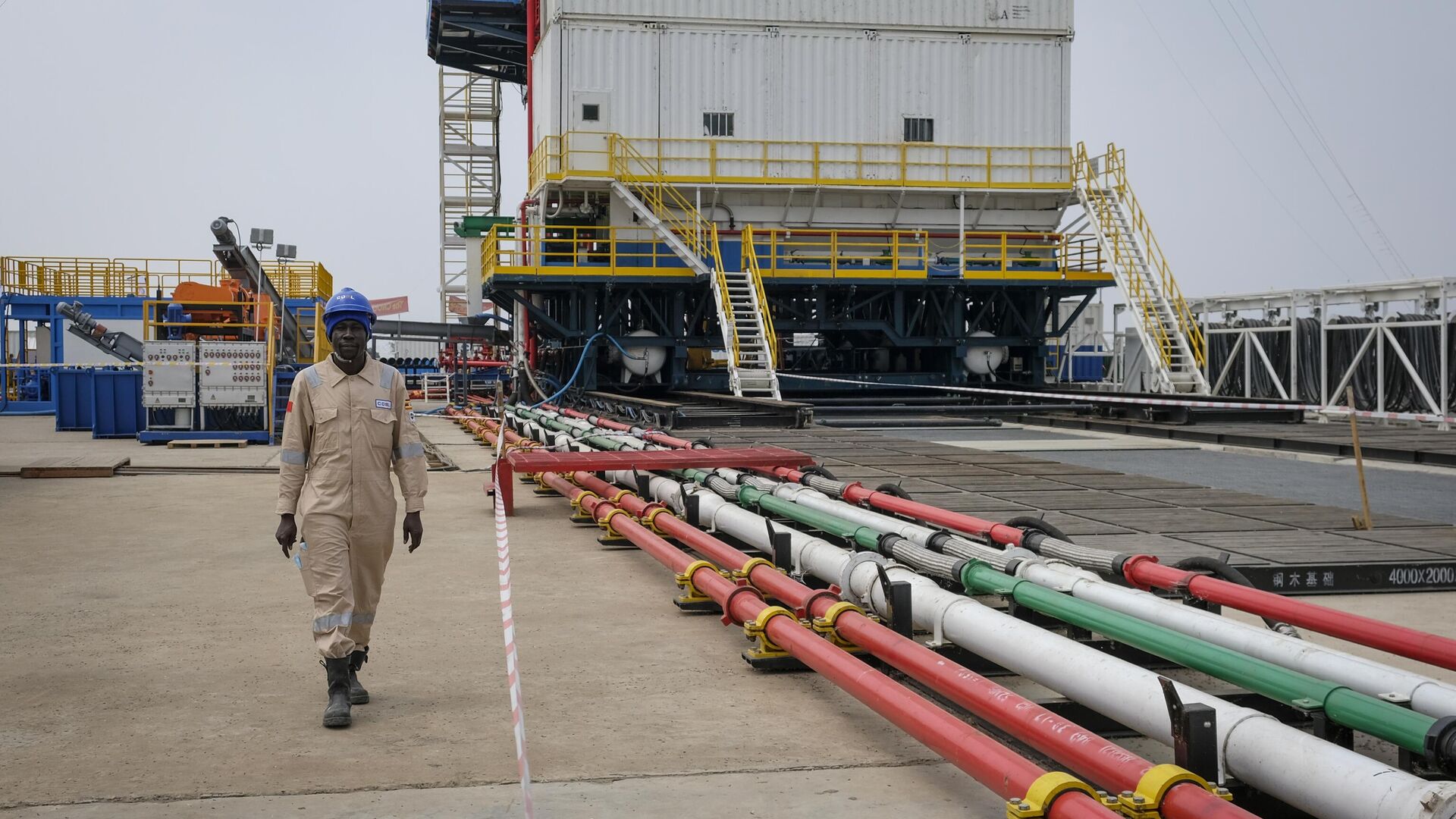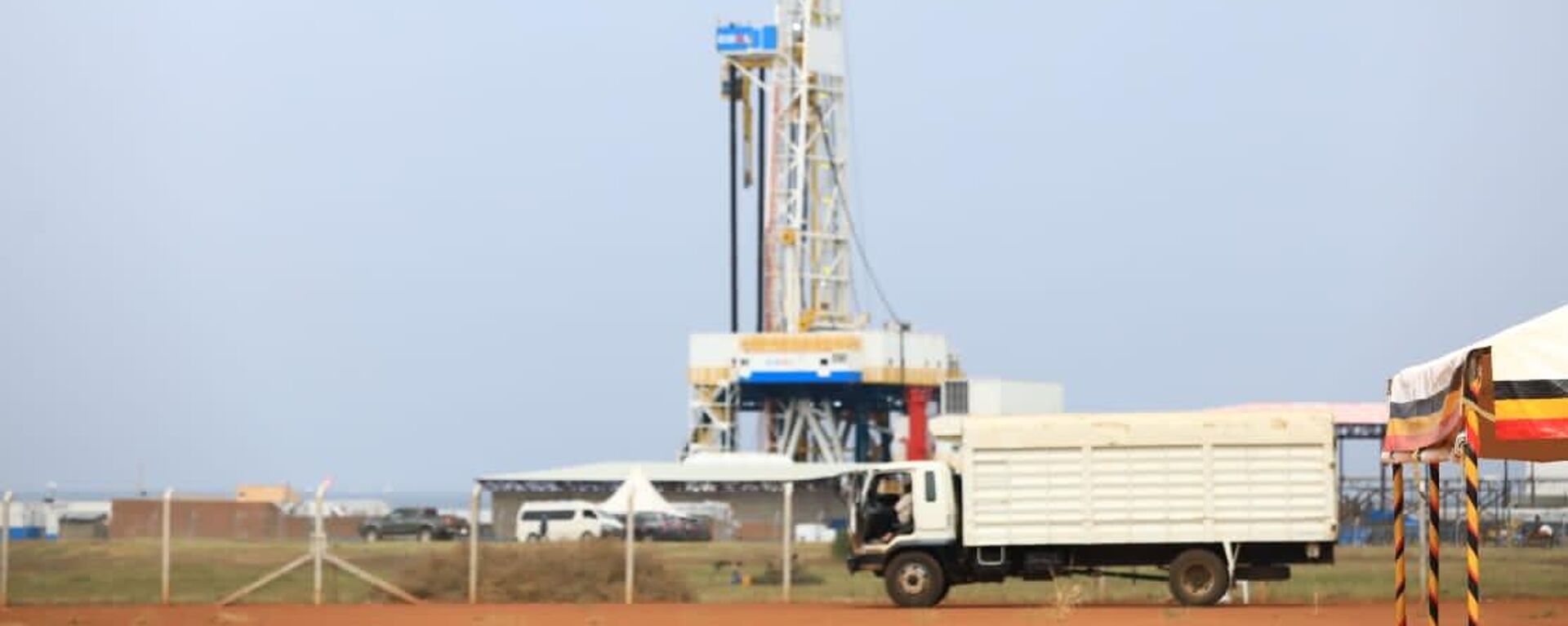https://en.sputniknews.africa/20230511/no-turning-back-east-africa-wont-backtrack-on-oil-projects-1059177737.html
'No Turning Back': East Africa Won't Backtrack on Oil Projects
'No Turning Back': East Africa Won't Backtrack on Oil Projects
Sputnik Africa
While the calls for green energy transition are intensifying across the world, East Africa should stick to its own course by developing and exploiting oil resources for the sake of its people, Uganda's Energy Minister said.
2023-05-11T12:54+0200
2023-05-11T12:54+0200
2023-05-11T12:54+0200
sub-saharan africa
east africa
uganda
oil
petroleum
energy
energy crisis
renewable energy
fossil fuels
east african community (eac)
https://cdn1.img.sputniknews.africa/img/07e7/05/0b/1059177903_0:160:3072:1888_1920x0_80_0_0_a724adea9870549004e21c2c55532cf5.jpg
East Africa should stick to its own course by developing and exploiting oil resources for the sake of its people despite calls for green energy transition, Uganda's Energy Minister Ruth Nankabirwa has said during the 10th East African Petroleum Conference in Kampala. According to the minister, the exploration of its oil resources is of critical importance given considerable energy shortages across the region, potentially allowing East Africa to pull its citizens out of energy poverty. The Ugandan minister's remarks came at a time when the region is seeking investors to finance the East African Crude Oil Pipeline Project (EACOP). She highlighted that the East African nations won't give up on this project, saying that those who criticize it undermine the continent's efforts to find a viable solution to the energy crisis. Peter Mathuki, the secretary general for the East African Community (EAC), for his part stated that member states should mull financing of the project from local revenue, noting that the region has institutions that can finance it, referring to the East African Development Bank.Nankabirwa noted that Uganda has recently made major strides to promote its energy projects, revealing that the final investment decision on the construction of a oil refinery will be announced in June. The refinery, which is expected to start production activities in 2027, will require a $4 billion investment. The announcement next month looks to attract various energy companies "to come on board in the development of the refinery and industrial park."The minister thanked those development partners who continued to cooperate with Uganda and East Africa "amidst the energy transitions debate and shrinking sources for financing oil and gas." She underscored that the nation vows to "not turn back", even though previous investors withdrew their support.Ugandan President Yoweri Museveni, who was represented at the conference by Vice President Jessica Alupo, hailed the efforts of the EAC to explore and exploit energy resources available in the region in his address.He emphasized that the countries recognize the threats posed by climate change and support measures to protect and preserve the environment. However, these measures should comply with the "principle of equity and common but differentiated responsibilities and respective capabilities, in the light of different national circumstances as enshrined in the Paris Climate Agreement." He recalled that this principle was key in reducing the fears of developing nations, in particular oil and gas-producing states, in the early stages of the energy transition debate. The president also noted that the organization is developing a regional power master plan that will identify generation needs to satisfy regional energy demand for the next 25 years. He stated that major electricity projects which look to interconnect all the region's countries are underway, saying that "we expect to have a fully interconnected East African power network."Apart from oil and gas projects, he added, the region is planning to develop its renewable energy sector, including wind, solar energy and biomass.The three-day conference is running under the theme "East Africa as a Hub for Investment in Exploration and Exploitation of Petroleum Resources for Sustainable Energy and Socioeconomic Development." The event brought together officials from the energy sector in the East African nations to raise awareness of the region's potential to develop fossil fuels and discuss investment opportunities in the oil and gas sector.
https://en.sputniknews.africa/20230124/1059178251.html
https://en.sputniknews.africa/20221209/1058502584.html
east africa
uganda
Sputnik Africa
feedback@sputniknews.com
+74956456601
MIA „Rossiya Segodnya“
2023
News
en_EN
Sputnik Africa
feedback@sputniknews.com
+74956456601
MIA „Rossiya Segodnya“
Sputnik Africa
feedback@sputniknews.com
+74956456601
MIA „Rossiya Segodnya“
east africa, uganda, uganda's energy minister, energy, energy crisis, fossil fuels, energy transition, oil and gas sector, east african community
east africa, uganda, uganda's energy minister, energy, energy crisis, fossil fuels, energy transition, oil and gas sector, east african community
'No Turning Back': East Africa Won't Backtrack on Oil Projects
Representatives of the East African nations' energy sector gathered at Petroleum Conference in Kampala, Uganda, on May 9-11 to call for continued exploration of the region's natural resources, in particular oil reserves, despite growing criticism over high carbon emissions.
East Africa should stick to its own course by developing and exploiting oil resources for the sake of its people despite calls for green energy transition, Uganda's Energy Minister Ruth Nankabirwa has said during the 10th East African Petroleum Conference in Kampala.
According to the minister, the exploration of its oil resources is of critical importance given considerable energy shortages across the region, potentially allowing East Africa to pull its citizens out of energy poverty.
The Ugandan minister's remarks came at a time when the region is seeking investors to finance the East African Crude Oil Pipeline Project (EACOP). She highlighted that the East African nations won't give up on this project, saying that those who criticize it undermine the continent's efforts to find a viable solution to the energy crisis.
"On the issue of financing the EACOP, we must get this money, those hiding money for fossil fuels, you’re hiding your heads to solve the global energy crisis, we are going on with our plans because this is not a project to be abandoned," Nankabirwa said.
Peter Mathuki, the secretary general for the East African Community (EAC), for his part stated that member states should mull financing of the project from local revenue, noting that the region has institutions that can finance it, referring to the East African Development Bank.
Nankabirwa noted that Uganda has recently made major strides to promote its
energy projects, revealing that the final investment decision on the construction of a oil refinery will be announced in June. The refinery, which is expected to start production activities in 2027, will require a $4 billion investment. The announcement next month looks to attract various energy companies "to come on board in the development of the refinery and industrial park."
The minister thanked those development partners who continued to cooperate with Uganda and East Africa "amidst the energy transitions debate and shrinking sources for financing oil and gas." She underscored that the nation vows to "not turn back", even though previous
investors withdrew their support.
Ugandan President Yoweri Museveni, who was represented at the conference by Vice President Jessica Alupo, hailed the efforts of the EAC to explore and exploit energy
resources available in the region in his address.
He emphasized that the countries recognize the threats posed by climate change and support measures to protect and preserve the environment. However, these measures should comply with the "principle of equity and common but differentiated responsibilities and respective capabilities, in the light of different national circumstances as enshrined in the Paris Climate Agreement." He recalled that this principle was key in reducing the
fears of developing nations, in particular oil and gas-producing states, in the early stages of the energy transition debate.
"The push for transition is coming at a time when East Africa has established significant oil and gas projects. In order to utilize these resources, we came up with regional refineries for the distribution of oil and gas products of the region to address energy needs," he said.
The president also noted that the organization is developing a regional power master plan that will identify generation needs to satisfy regional energy demand for the next 25 years. He stated that major electricity projects which look to interconnect all the region's countries are underway, saying that "we expect to have a fully interconnected East African power network."
Apart from oil and gas projects, he added, the region is planning to develop its renewable energy sector, including wind, solar energy and biomass.
"The EAC partner states are making major investments in the power sector and creating robust institutional arrangements to avoid the mistakes of the past when we suffered serious power shortfalls," the president stressed.
The three-day conference is running under the theme "East Africa as a Hub for Investment in Exploration and Exploitation of Petroleum Resources for Sustainable Energy and Socioeconomic Development."
The event brought together officials from the energy sector in the East African nations to raise awareness of the region's potential to develop fossil fuels and discuss
investment opportunities in the oil and gas sector.



